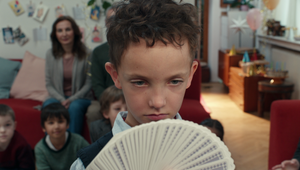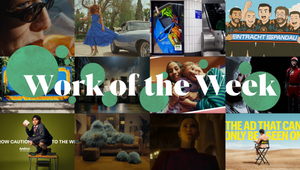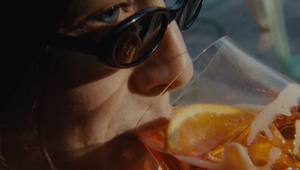
5 Minutes with… Alexander Kalchev

Alexander Kalchev has been at DDB Paris for the entirety of his 10-year advertising career. In that time Bulgarian-born Alexander has advanced from a creative to a creative director and, just over two years ago, to executive creative director, the title that he still holds. But he almost didn’t end up in advertising. He was studying a philosophy degree with the intention of a life in academia until he realised that it just wasn’t for him. A chance search for design schools led him to the Miami Ad School in Hamburg and, after a flurry of internships, eventually to Paris and DDB.
And if that wasn’t enough to fill what is still a relatively short career, in 2013 he turned his hand to directing, winning a silver Lion in the process. He’s still repped by Carnibird in France but has had to put his directing endeavours on hold since becoming an ECD – we hear that’s quite a time-consuming role in itself.
LBB’s Addison Capper chatted with him to find out more.
LBB> You've been at DDB Paris since you graduated, which was around 10 years ago. Why is the agency such a good fit for you?
AK> It's always about the people - that's what makes an agency. In general, people that come to work for DDB Paris stay for a very long time. We did a calculation and looked at how long people had been at the agency, and the average was a little over seven years. So, I'm not an exception! It's a good place where people pride themselves on good work.
And the industry has changed so much over the last 10 years. It's constantly evolving and I'm constantly learning new things. My function has also changed enormously over the last 10 years. I started as an art director/writer, then I became a creative director… at one point I started directing, and now I've been ECD for about two and a half years. I've never had the time to get bored!
LBB> As you said, you've been ECD for about two-and-a-half years now - how have you found the transition and how do you go about getting the best out of your creatives?
AK> Not forgetting what it means to be a creative is really important, but that's not a problem for me. It's been an incredibly gratifying, but tough, experience.
It's hard to articulate what an ECD really does because you kind of do everything. You go from client management, to new business, to overseeing work, to production. There's never a dull moment. What's really gratifying – and no one really tells you about this when you start out – is seeing others succeed. If you take this job with the idea that you'll become some kind of super creative, you're in for a surprise. But if you take the job with the idea that people are cool and interesting and varied, then it really is one of the most rewarding experiences that you can have.
I don't really have any special tricks or techniques. The one thing that I've learned is that you need to let people be themselves. Sure, there are things that I love and you could say that there's a style of work that I like. But that doesn't mean that I won't buy work that's not in my style, because we have to encourage diversity like that. I hate the idea that you can always tell that a piece of work comes from a certain agency. It stifles the diversity that ultimately leads to good work. So, just don't ever think that you know better than anybody else, and you'll be ok.
LBB> And so what do you look for when hiring new talent into the agency?
AK> I look for curiosity. I really like the idea of starting with people who are very young and fresh into their career, and just looking for that little spark. I rarely ask many advertising questions in interviews. In general, I care more about what they are like as human beings rather than the latest campaign that they like.
As human beings we are terrible at judging people. Interviews are a very subjective process – it's almost impossible to truly judge who a person is. It really comes down to gut feeling and shared interests. But one thing I really do look at is if the person can fit into the culture of the agency. Can this person fit into the family or gang?
I read a great article by James Murphy [one of the founding partners at adam&eveDDB London] and he said that the best agencies function like a gang, and we have that vibe here. It's so important that a new person has shared values and clicks with the people that make up the agency. If a person is a great creative but isn't a team player, then DDB Paris is not for them. Great work comes out of people talking to each other, respecting each other and pushing each other forward - healthy competition.
LBB> How did you get into advertising in the first place? I know you studied at Miami Ad School in Hamburg, so does that mean that it was something you always wanted to do?
AK> No, it was random as hell. I was studying philosophy at university in Scotland and always had it in my head that I'd be involved in academia or something. But then I realised that I just didn't really want to do it. I thought that I might like to study design because I had done some already – mostly as a hobby – and randomly while looking for design schools, I stumbled across Miami Ad School. At that time, I didn't really know anything about advertising – I wasn't obsessed with commercials as a kid or anything – but I thought it looked pretty cool and interesting. And that was that.
LBB> You're a director as well as a creative, something you started doing in 2013 - what inspired that move?
AK> I've always loved being on shoots and the passion and energy of film crews. When you put a crew together and see the limits that they'll surpass, it's an incredible experience. I've also always thought that not having a budget is not necessarily an excuse for not making things happen. I like doing things even if they're low budget and involving myself almost to an unreasonable level. Being professional is somewhat overrated. I love the passion that being amateur brings to the craft – not amateur in terms of the craft but treating something as if it’s your own.
Anyway! Long story short: there was a wonderful idea that we had and very little money to make it happen – we were never going to get a production company on board in the time we had or the kind of director that we wanted. It was just too good an idea to not do, so we produced it all as a team with the help of a very young production company. It ended up as a pretty cool film for Honda and it won a silver Lion, but it was raw and involved intense experiences of bonding. It was probably one of the most fulfilling experiences I've had in my professional life because it felt like we were doing something with the passion and commitment that went beyond advertising. It was our thing.
And then one thing lead to another. That was pretty successful and I really enjoyed the process too, so I did some other commercials. But since I took the ECD role the whole thing has been a bit on hold - there are only 24 hours in a day! But I do think it's important for creatives to be makers nowadays. I'm not saying that we should or could do everything and be jacks of all trades, but this whole process made me much more appreciative of what a director and production company does.
LBB> You’ve kind of touched on this there, but I want ask - how does being a director aid you as a creative and, vice versa, how does being a creative help you as a director?
AK> There are so many directors that come from a creative background and I think it helps to an extent because you appreciate the sharpness of a concept. I think also you are probably more straight to the point – you want to tell the story and care a little less about the imagery. And vice versa, as I said, knowing how a shoot comes together under different circumstances is so helpful. In a world where everything has become far too organised and quantified, there is so much intuition that goes into a shoot. It’s enormously important to trust those people and close your eyes and jump.
LBB> Let’s talk about some work. Which recent pieces are you particularly proud of and why?
AK> Well I can’t speak much about directorial work because, as I said, that element has been on hold for the past two years! But in terms of DDB Paris, I’m really happy with the recent Ubisoft films that we put out for Assassin’s Creed. We just launched a big film directed by Daniel Wolfe for the launch of the game. It was an incredible experience and a massive shoot with a lot of challenges, but it was fucking good to watch.
LBB> How do you see the state of French advertising at the moment?
AK> It’s good and healthy. There’s good competition and there are a lot of smaller agencies that are now well established on the market. There are still the big ones, like BETC, DDB and TBWA – they’re all doing really well. The standouts in terms of smaller agencies are definitely Buzzman – they’ve really managed to find their voice and do wonderful work – and also Romance. They’re a really young agency that’s part of the Omnicom Group. A few months ago they released a supermarket ad that I think was the most successful film out of France this year. I love it. It’s kind of like a French John Lewis, so to say. It’s also good because we’re beginning to see more long form commercials like that in France.
Things are good, more and more work is coming, and I’m really encouraged to see that more small agencies are coming and leaving their mark. We’re missing that independent spirit in France right now.
LBB> What do you like to get up to in your free time to recharge your batteries? Any weird hobbies to tell us about?
AK> I have the ultimate hobby that a man can have – I have an 8-month-old son! So any moment that I don’t spend at work or sleeping - and sleeping doesn’t happen very often at the moment – I spend with him. It’s incredible because I’m discovering a lot of things about myself, but also seeing a whole new world and things for the first time. It’s an incredible thing – when have you ever seen someone eat a carrot for the first time? It’s such a funny experience. So, my batteries are recharged every night and it’s a beautiful, beautiful experience.















